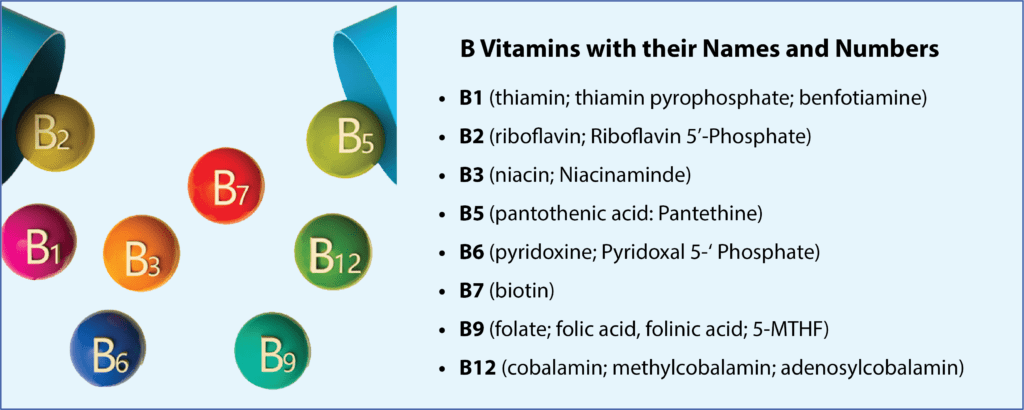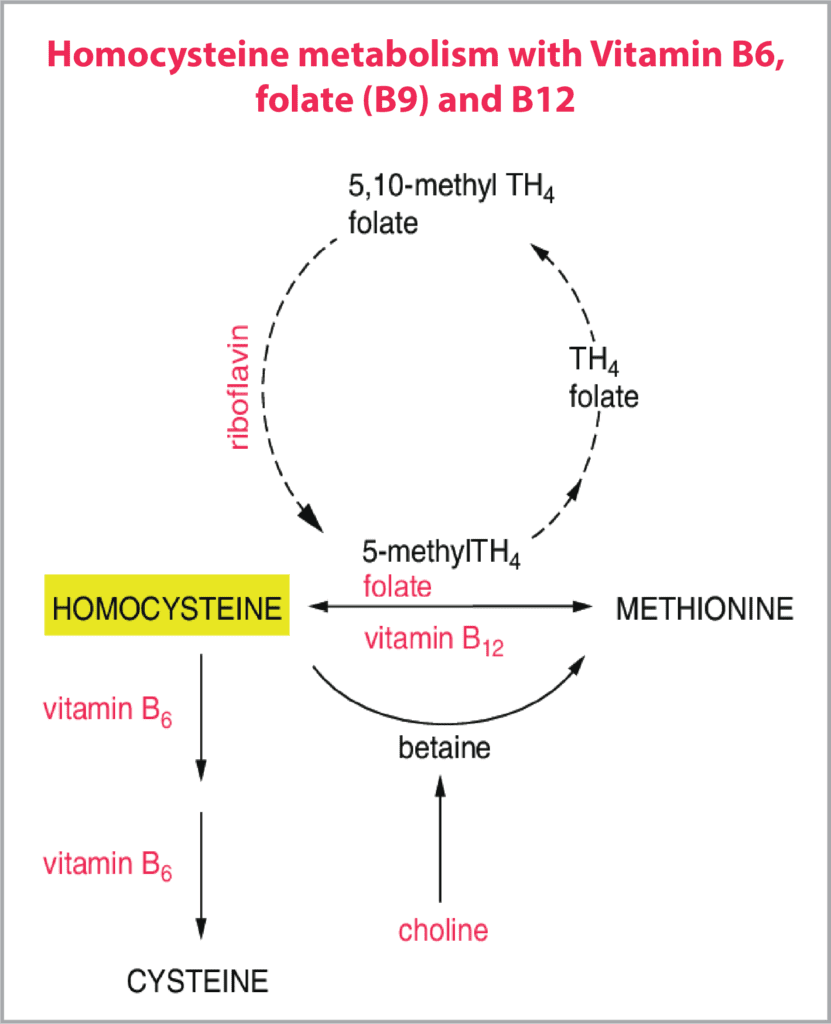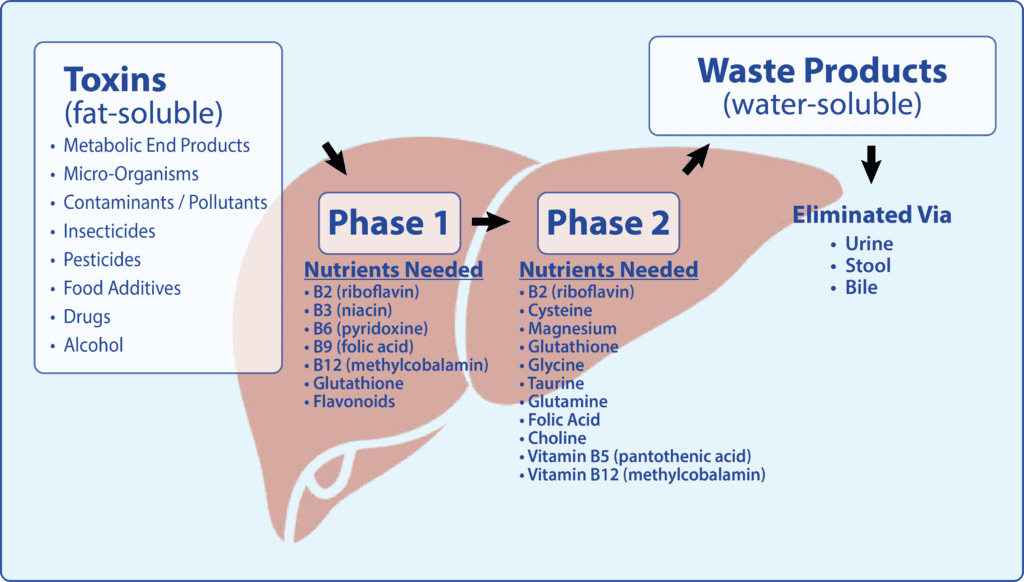B vitamins play a vital role in maintaining good health. They serve many roles and are essential for hundreds of cellular processes in the body such as energy production, red blood cell formation, supporting healthy brain function and aiding in methylation and detoxification.1
How well do you know your B’s?
How many B vitamins are there? This can be a tricky question. Today there are eight water-soluble B vitamins that form what is known as the “B Complex.”

To B or not to B
Why are there gaps in the B vitamin numbers? Where are vitamins B4, B8, B10 and B11?
These four are no longer considered B vitamins since they are either synthesized in the body or not positively essential. However, you could say that if the B vitamins are siblings, these cofactors would be their cousins in the family:
B4 – Choline
B8 – Inositol
B10 – PABA (Para-aminobenzoic acid)
B11 – Pteryl-hepta-glutamic acid
These nutrients perform similar functions to the eight B vitamins and work together to synergize their activities in the body. For example, choline is supportive of brain function, helping to regulate memory and mood. Inositol may provide support for hormonal imbalance in the ovaries and may aid in maintaining healthy blood sugar balance. PABA’s role in supporting growth of gut bacteria promotes GI health. These cofactors are sometimes included in a B complex formula to increase overall support.
Vital role of B Vitamins in Homocysteine Metabolism
B vitamins are also considered enzyme cofactors, playing a key role in key enzymatic reactions.
While on the topic of important reactions that B vitamins help carry out, can you identify B vitamins that are involved with the metabolism of homocysteine?
Vitamin B6, folate and B12 assist with the metabolism of homocysteine, and elevated homocysteine levels usually indicate a deficiency in one or more of these B vitamins.2
Homocysteine is an intermediary amino acid produced as part of the body’s methylation process, and it is generated during the conversion of methionine to cysteine with the support of vitamin B6. In a healthy person, homocysteine levels commonly range from around five to 15 micromoles per liter (mcmol/L). Published studies show that a high homocysteine level has been a predictor of potential health issues and is an increased risk factor for cardiovascular disease, stroke, osteoporosis and cognitive decline.
The accompanying chart shows how various B vitamins and cofactors play important roles in metabolism of homocysteine.

B Vitamins are essential in Liver Detoxification
B vitamins are necessary for efficient excretion of toxins and waste removal in the liver. As shown below, both Phases I and 2 in the body’s detoxification process rely on the B vitamins to function properly. Supplementing with the B complex vitamins can be especially beneficial in patients with heavy metal toxicity, fatty liver disease, and drug and alcohol withdrawal. B vitamins are also required to produce glutathione, the body’s most powerful antioxidant.

Recognizing a B Deficiency
Blood or urine testing can be used to check vitamin B levels in the body. Can you identify some signs and symptoms of potential deficiency in B vitamins?
Thiamine B1: low mood, loss of appetite, fatigue, and numbness. Thiamine is the most common B vitamin deficiency among alcoholics.
Riboflavin B2: cracks in corners of the mouth, inflammation of the mouth and tongue, reddening and itching of the eyes, light sensitivity, and skin lesions
Niacin B3: digestive trouble, dry and itchy skin
Pantothenic acid B5 – B5 is thought of as the “anti-stress” B vitamin. Deficiency is rare since it’s found in many foods. Fatigue is the first sign since B5 is required for optimal adrenal function.
B6: Deficiency is rare in healthy individuals. Symptoms of deficiency include elevated homocysteine, nausea, worsening PMS symptoms, weakness, dizziness, irritability and fatigue.
B7 Biotin: hair loss, brittle nails, low mood, dry and itchy skin, and nausea
B9 Folate/Folic acid: birth defects, elevated homocysteine, fatigue, hair loss, loss of appetite, digestive trouble, and nausea
B12: B12 deficiency is probably the most common B vitamin deficiency in the US. Deficiency is prevalent among patients with both type 1 and type 2 diabetes.5 Symptoms of low B12 include anemia, fatigue, low mood, loss of appetite and nausea.
Who might be at extra risk for deficiency?
Some groups of people are more at risk for vitamin B deficiency. These include vegans and strict vegetarians, pregnant women, individuals on proton pump inhibitors and those taking metformin.1
In fact, specific nutrient depletions are known to be associated with medication use, and certain pharmaceuticals can be a culprit contributing to low B vitamin levels. Elderly patients who take three or more medications have been found as more likely to have vitamin D, B1, B2, B6, B9, and B12 deficiencies.7 Some patients may require supplementation to avoid deficiencies.
Can you name some common drugs that may deplete B vitamins?

Overall, B vitamins support various vital body functions, promote energy production, provide protection against elevated levels of homocysteine, and they assist with the detoxication process. For those taking medications known to deplete B vitamins, who are experiencing signs of deficiency and/or who do not eat a well-balanced and nutritious diet, supplementing with a B complex may be a prudent protocol.
References
1. Allen LH. How common is vitamin B-12 deficiency? Am J Clin Nutr. 2009;89(2):693S-6S.
2. Schnyder G, Roffi M, Flammer Y, Pin R, Hess OM. Effect of homocysteine-lowering therapy with folic acid, vitamin B12, and vitamin B6 on clinical outcome after percutaneous coronary intervention: the Swiss Heart study: a randomized controlled trial. JAMA. 2002;288(8):973-979.
3. Homocyst – Salama, Amany. (2021). Nutritional Management of Hyperhomocysteinemia. 10.1007/978-3-030-57839-8_16.
4. Reilly W, Ilich J. Prescription drugs and nutrient depletion: how much is known? Adv Nutr. 2017;8:23.
5. Kibirige D, Mwebaze R. Vitamin B12 deficiency among patients with diabetes mellitus: is routine screening and supplementation justified? J Diabetes Metab Disord. 2013;12:17.
6. www.marconews.com/story/life/2019/09/30/ask-pharmacist-b-vitamin-deficiency-apparent-potty/3775947001/
7. www.uspharmacist.com/article/druginduced-nutrient-depletions-what-pharmacists-need-to-know

